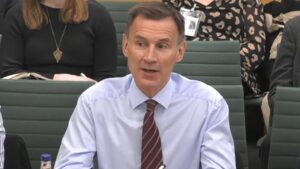UK economy to avoid recession this year as GDP growth beats forecasts

<?xml encoding=”utf-8″ ?????????>
Britain’s economy topped analysts’ expectations to grow slightly in September putting the UK on course to narrowly escape the risk of a recession this year, according to official figures.
Gross domestic product increased 0.2 per cent month-on-month in September, above City analysts’ expectations and higher than August’s downwardly revised 0.1 per cent expansion, according to the Office for National Statistics (ONS).
The surprise expansion has all-but removed the risk of the UK slipping into a recession this year, defined as two straight quarters of output contraction. Over the three months to September, the ONS estimated that the economy flatlined with zero growth.
As a whole, the UK economy is now 1.8 per cent larger than before the pandemic. The ONS, before a historic upward revision to its estimates at the end of September, had thought that the economy was still 0.2 per cent smaller, lagging peers.
The September figure issued today was driven by a 0.2 per cent rise in activity in Britain’s all-important services sector. Falls in the health, management consultancy and commercial property rental sectors were offset by growth in engineering, car sales and machinery leasing.
Construction output rose 0.4 per cent but factory production flatlined at 0 per cent expansion.
Darren Morgan, the ONS director of economic statistics, said: “In the month of September the economy grew slightly, with increases in film production, health and education. This growth was partially offset by falls in retail and computer programming.”
Although better than expected in September, UK economic growth has struggled this year under the weight of higher interest rates and rapidly rising prices. Inflation has dropped to 6.7 per cent from a 40-year high of 11.1 per cent but consumer finances have yet to recover from the price surge despite wages growing at a near record pace.
Samuel Tombs, the chief UK economist at Pantheon Macroeconomics, said that the chances of a recession looked low and expected a 0.3 per cent quarter-on-quarter increase in GDP in the fourth quarter. “The economy narrowly avoided contracting in Q3, and we continue to think that it can maintain this resilient performance in Q4,” he said.
“We’re confident that households’ real expenditure will pick up in Q4, driven by a renewed recovery in real disposable income. Wages look set to rise more quickly than consumer prices again in Q4, as energy bills fall further and goods price stabilise.”
He expects business investment to remain resilient despite high interest rates while businesses work through the backlog of potentially profitable projects “that were put on ice during the years of Brexit and Covid uncertainty”.
Martin Beck, at the EY Item Club, also expects a stronger performance in the fourth quarter with modest growth but “a pattern of near-stagnation that’s likely to continue into early 2024”.
He added: “The impact of higher mortgage payments is growing as more homeowners come to the end of previous fixed-rate deals. A combination of still-high inflation and frozen tax allowances mean fiscal drag is also eroding consumer spending power. The jobs market appears to be weakening, although data issues cloud the picture and higher corporate financing costs and economic uncertainty are likely inhibiting investment.
“That said, the economy’s positives should prevent a serious downturn in the short-term and prompt a pick-up in growth from the second half of 2024. The recent return to growth in real wages should build as inflation slows faster than sticky pay growth. Higher interest rates are delivering an income boost to savers and a wide range of indicators suggest that the labour market is loosening only slowly.”
Lindsay James, investment strategist at Quilter Investors, was more cautious, noting “cracks having appeared in consumer spending and business activity with a knock-on effect for labour demand”.
She added: “ September’s data did positively surprise thanks to the UK’s strong services sector, but was not enough to offset July’s negative print and produce any growth in Q3 relative to the previous quarter. While somehow avoiding a recession this year, today’s no-growth reading means the UK economy is flatlining with only 0.2 per cent economic growth in the last six months.”
The Bank of England has lifted the UK base rate to a 15-year high of 5.25 per cent from a record low of 0.1 per cent in November 2021, which has removed demand from the economy.
UK GDP is poised to stagnate for the next year, with the Bank of England forecasting zero growth until the end of 2024. Inflation is expected to remain above the 2 per cent target until the end of 2025, meaning that Britain would be in a state of economic “stagflation”, where price growth is high and growth is low.
Financial markets expect the Bank of England to begin lowering interest rates in the third quarter of next year to reverse the expected economic downturn. Andrew Bailey, the central bank’s governor, emphasised this week, however, that the base rate would need to remain high for an “extended period” to prevent a renewed inflation surge.




